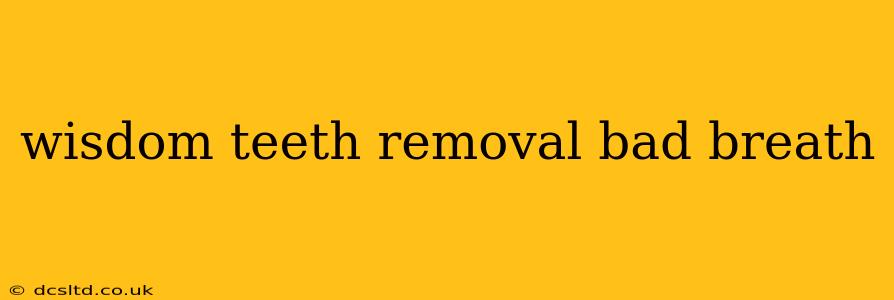Wisdom teeth removal is a common procedure, but the recovery process can sometimes be accompanied by unpleasant side effects, including bad breath (halitosis). Understanding the causes and how to manage this issue is crucial for a comfortable recovery. This comprehensive guide will address common concerns and provide helpful advice.
Why Does Wisdom Teeth Removal Cause Bad Breath?
Several factors contribute to bad breath after wisdom teeth extraction. The most significant is the presence of food debris and blood clots in the extraction sockets. These provide a breeding ground for bacteria, leading to a foul odor. The healing process itself involves inflammation and the breakdown of tissue, further contributing to the problem. Additionally, dry socket, a painful complication where the blood clot is dislodged, can significantly worsen bad breath due to the exposure of the underlying bone. Finally, medications prescribed for pain management can sometimes have a drying effect on the mouth, reducing saliva production, which normally helps to cleanse the mouth and prevent bad breath.
How Long Does Bad Breath Last After Wisdom Teeth Removal?
The duration of bad breath after wisdom teeth removal varies depending on several factors, including individual healing rates, oral hygiene practices, and the presence of complications. Generally, you can expect some degree of bad breath for a few days to a week. However, if the bad breath persists for longer than a week, or if it's accompanied by other symptoms like severe pain, swelling, or fever, it's crucial to consult your dentist or oral surgeon immediately. This could indicate a more serious problem, such as an infection or dry socket.
How to Prevent Bad Breath After Wisdom Teeth Removal?
Proactive measures are key to minimizing bad breath during recovery. Here's what you can do:
- Maintain impeccable oral hygiene: Gentle rinsing with a prescribed mouthwash is vital. Avoid forceful rinsing or spitting, which can dislodge the blood clot. Brush your teeth gently, avoiding the extraction sites.
- Avoid smoking and alcohol: These habits can interfere with healing and worsen bad breath.
- Eat a healthy diet: Focus on soft foods that are easy to chew and won't get stuck in the extraction sites.
- Stay hydrated: Drinking plenty of water helps to flush out bacteria and keeps your mouth moist.
- Use a tongue scraper: This helps remove bacteria from the tongue, a significant contributor to bad breath.
What if I Have a Dry Socket?
A dry socket is a painful condition where the blood clot dislodges from the extraction site. It's characterized by intense pain, a bad taste in the mouth, and a noticeable foul odor. If you suspect you have a dry socket, contact your dentist or oral surgeon immediately. Treatment usually involves cleaning the socket and packing it with a medicated dressing to promote healing. Managing dry socket is crucial because it can significantly prolong bad breath and increase the risk of infection.
Can I Use Mouthwash After Wisdom Teeth Removal?
Yes, but it's crucial to use a mouthwash recommended by your dentist or oral surgeon. Avoid alcohol-based mouthwashes, as these can irritate the extraction sites and delay healing. Many dentists prescribe a chlorhexidine gluconate mouthwash, which has strong antiseptic properties.
Are there any specific foods I should avoid after wisdom teeth removal?
It's best to avoid foods that could get lodged in the extraction sockets or cause irritation. This includes:
- Spicy foods: These can irritate the sensitive tissues.
- Hard, crunchy foods: These could dislodge the blood clot.
- Extremely hot or cold foods: These can cause discomfort.
- Foods that require excessive chewing: Opt for soft, easily digestible foods for the first few days.
When Should I Call My Dentist?
Contact your dentist or oral surgeon immediately if you experience:
- Persistent, severe pain
- Excessive bleeding
- Signs of infection (fever, swelling, pus)
- Bad breath that persists for more than a week
- Dry socket symptoms
By following these guidelines and staying vigilant about potential complications, you can minimize the likelihood of prolonged bad breath and ensure a smoother recovery after wisdom teeth removal. Remember, communication with your dental professional is key.
